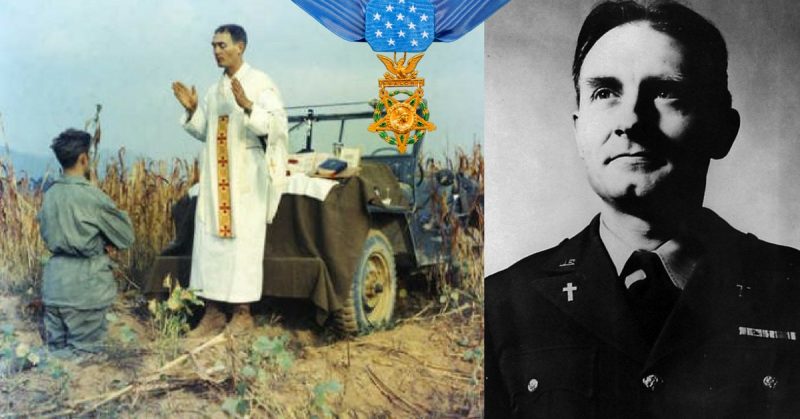He didn’t carry a weapon, he wasn’t there to fight, but that didn’t stop chaplain Emil Kapaun from earning the nation’s highest military honor for gallantry. When over 20,000 Chinese soldiers surprised a few thousand men of the 8th Cavalry Regiment at the Battle of Unsan, one of the worst military routs of the war was about to take place.
Casualties were high as bullets, mortars, and rockets tore through the air before the order for every able-bodied man to withdraw was given. Having already braved the heavy fire to offer services and first-aid to the wounded, this chaplain refused to leave. The enemy broke through, and combat was hand-to-hand, and yet Kapaun continued to serve faithfully and his time as a POW wouldn’t be any different.
He continually encouraged the men and willingly gave up his own food and medicine on their behalf until he passed away from his own medical conditions.
In 2013, President Obama posthumously awarded Kapaun the Medal of Honor after an extensive review of his record was conducted. As a result, we now have new knowledge of a story that had been long lost to history and yet is worthy of remembrance.
A Life of Service
Emil Kapaun was born on April 20th, 1916 on a farm just south of Pilsen, Kansas. Knowing early on he wanted to be in service to the Church, he attended seminary and was ordained a Catholic priest on June 9th, 1940.
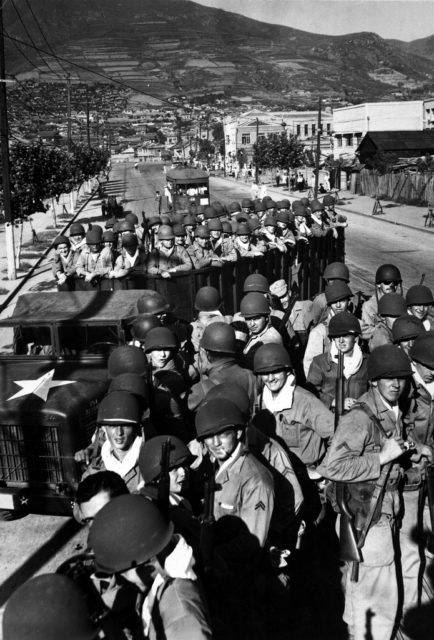
However, he was not beyond service to his country as he joined the US Army chaplains in 1944 seeing service in the Burma theater of operations. He briefly returned home in 1946, but in September of 1949, he resumed his duties as a Chaplain and headed for Japan.
He would be assigned to the 8th Calvary Regiment, which was one of the first to hit the beaches when the United States pushed back from the Pusan Perimeter in 1950. Working his way North with the men, he continued to serve with inexplicable gallantry and was awarded a Bronze Star with a “V” for rescuing the wounded under fire.
He would write home about the progress they were making as they closed in on the Chinese border and had hoped he would be home soon. However, the war had other plans, and more gallantry would be required of the Chaplain.
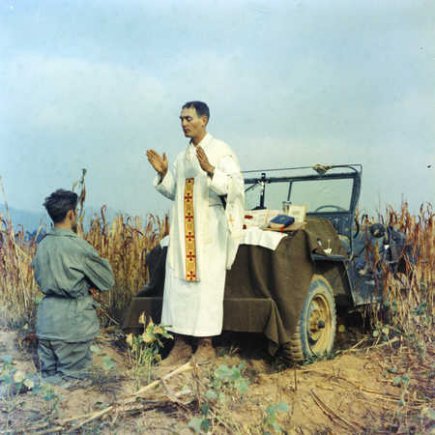
With hopes that the war would soon be over as the United Nations forces were well north of Pyongyang, the 8th Calvary Regiment dug in around the North Korean town of Unsan. Unfortunately for the 8th, approximately 20,000 Chinese soldiers had set their sights on the town in the hopes of destroying multiple ROK Divisions.
On the afternoon of November 1, 1950, the Chinese unleashed their surprise assault taking the American troops completely by surprise. Before midnight, the entire ROK 15th Infantry Regiment had been destroyed and 1st and 2nd Battalion of the 8th Calvary were running dangerously low on ammunition.
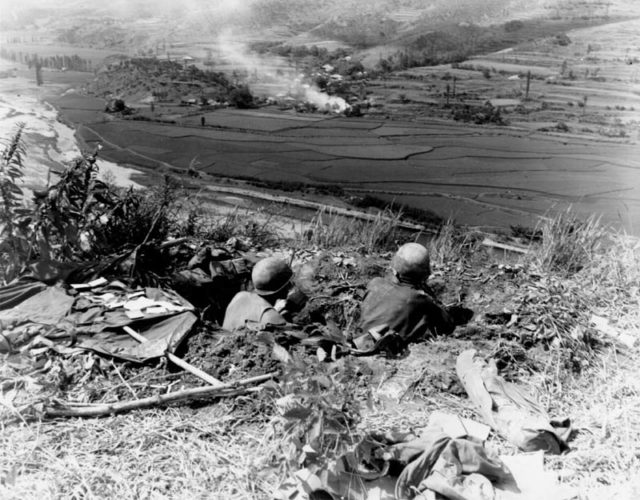
Disaster at Unsan
The 3rd Battalion had initially been left alone in the fighting and by using tactics of infiltration the North Korean forces had caused chaos and confusion in the middle of the night and the 3rd Battalion was virtually surrounded. Casualties through the 8th were soaring and entire ROK regiments virtually ceased to exist.
The order to retreat was given as every able bodied man was given orders to withdraw while leaving heavy equipment behind. It was a rout, and the Americans were on their way south. It was in the context of this scene that Chaplain Emil Kapaun calmly walked the battlefield caring for the wounded and it was in the face onslaught that he willingly remained behind with the wounded to be captured.
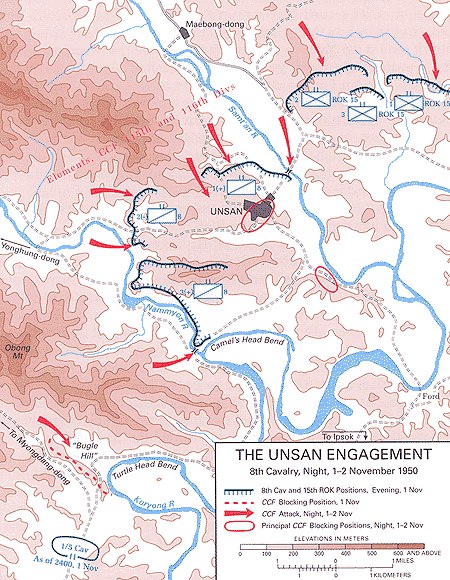
When the Chinese arrived, the fight continued, leading to the certain death of every American soldier left behind. During the chaos of the battle, Kapaun noticed a wounded Chinese officer and ran through the fire to render aid and hopefully negotiate a peaceful surrender.
Kapaun’s gallantry worked, and the Chinese officer called out to his men to cease the killing. At one point, a Chinese soldier drew down on an American First Sergeant preparing to shoot when with no regard for his own life, Kapaun pushed him out of the way. They were now POWs and their ordeal in the war was far from over.
Once in the prison camp, Kapaun continued to serve the men whom he regarded as his congregation. During the brutal winter of 1950, while men were freezing to death in their sleep, Kapaun would offer them his own clothes.
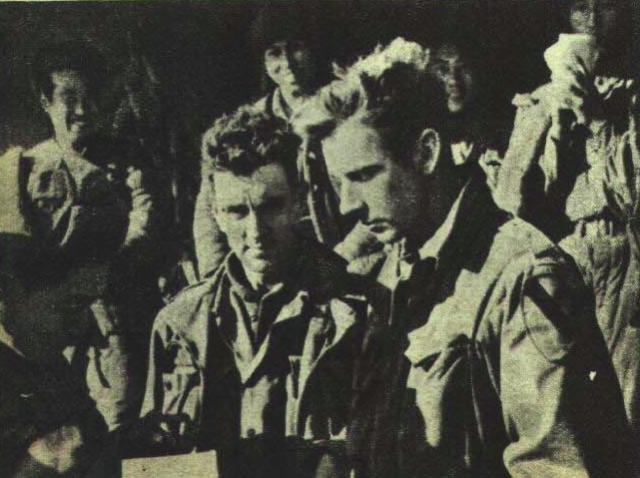
As they starved on tiny rations, it was common for Kapaun to be seen giving his food to the needy. He would even forage food from the fields around the camp and sneak it past the guards not for himself, but for others.
A Final Service
As the men were ravaged by dysentery and disease, he boiled their water, washed their clothes, and treated their wounds. The guards would often mock him for his faith and force him to stand in the cold naked for hours.
He never lost his faith and he never ceased to serve the men. On Easter of 1951, he led a service using twigs put together as a cross and a small prayer missal he had hidden.
However, disease began to take its toll on Kapaun. He developed a limp from a blood clot which was followed by dysentery and pneumonia. Once the North Koreas realized his condition, they sought their chance to rid the camp of the man who inspired so much hope in the men.
He was taken to a “death house” against the pleadings of the men where he would be left without food or water to die. Kapaun’s words to his men were simply, “I’m going where I’ve always wanted to go.” He died on May 23rd, 1951 and while he was initially honored with the Distinguished Service Cross, subsequent accounts would result in upgrading to the Medal of Honor.
He inspired the men in battle with his gallantry, he inspired the men in the POW camp with his mercy, and he can know continue to inspire us all with his dedication to service and sacrifice.
